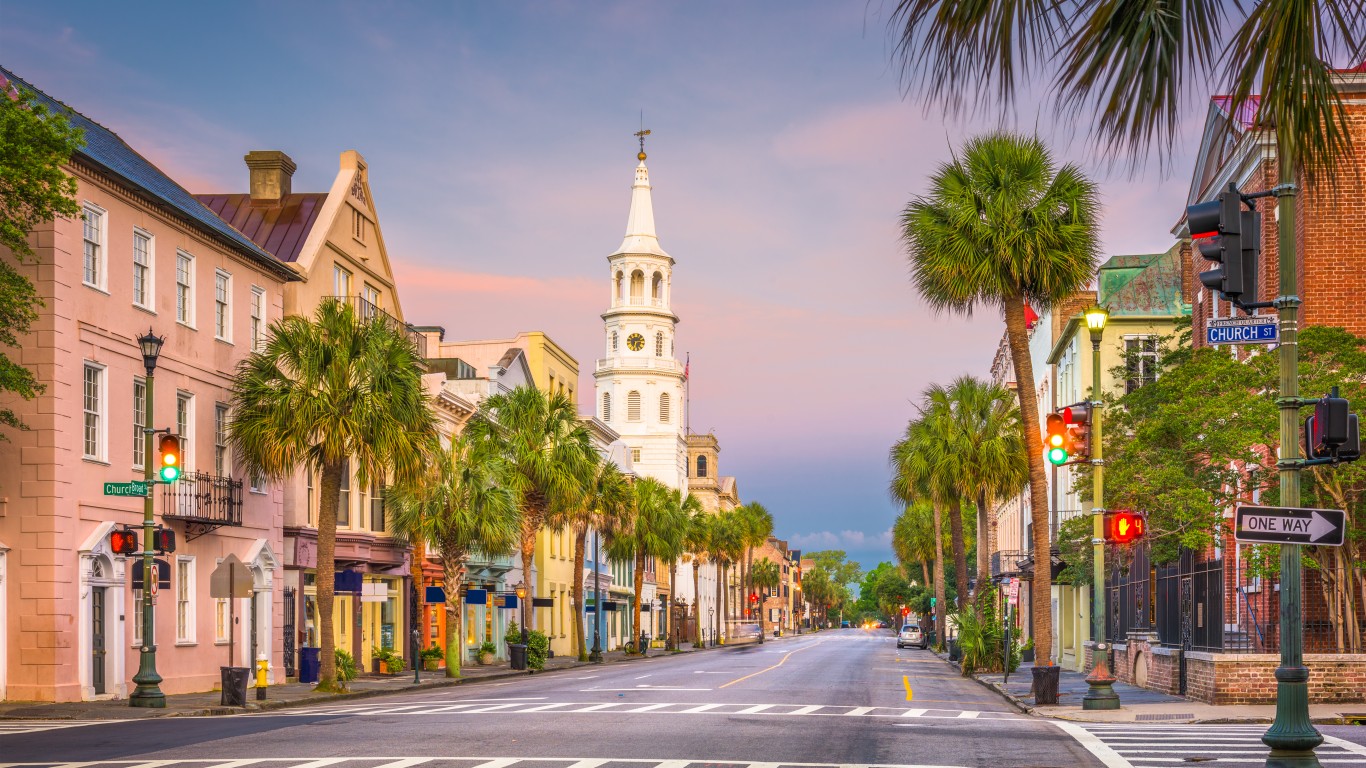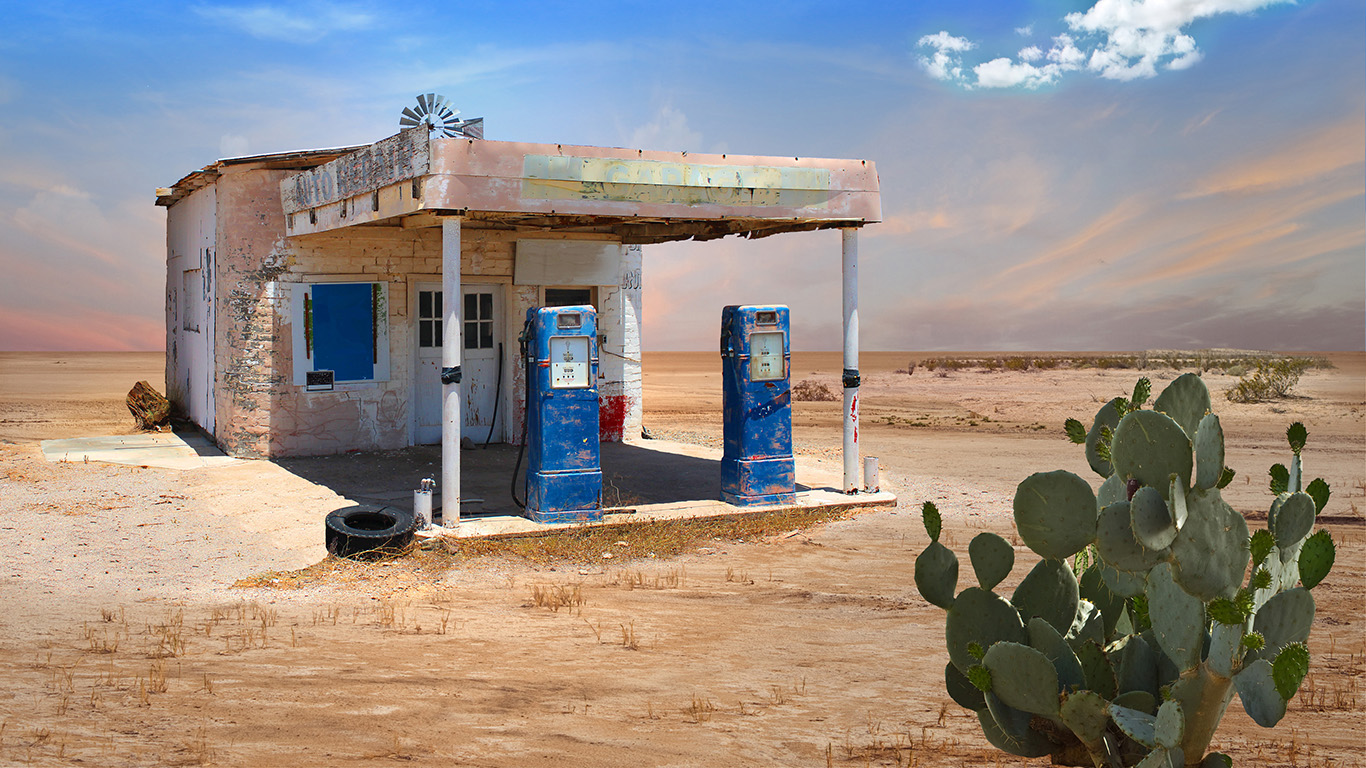
Americans are more likely to pay with a credit card than with cash than ever before. With a credit card, consumers can buy now and pay later and earn rewards like cash back and travel points for meeting certain spending thresholds. While credit cards have obvious appeal, they can also be dangerous, as easy credit appears to be saddling a growing number of Americans with considerable debt.
According to the Federal Reserve, Americans owe a record $1.04 trillion in credit card debt — up from less than $854 billion five years ago. According to Ted Rossman, an industry analyst at research group creditcards.com, about 40% of Americans have enough income to pay off their balance — and do so in full every month. For them, a high credit card balance is not a problem.
For the remaining 60%, however, maintaining a high credit card balance can mean hundreds of dollars in interest payments a year and possibly a low credit score.
On average, Americans owe $6,354 on bank-issued credit cards. At the state level, average credit card debt per capita varies substantially. 24/7 Wall St. reviewed the average bank card balance from creditcards.com to identify the states with the most credit card debt.
Individuals with high credit card balances tend to have some common traits. “The more cards, the more income, typically the higher balances are going to show on your card,” Rossman said.
Indeed, states with higher debt tend to be home to higher-income residents and report more credit cards per person. These states also tend to have a higher overall cost of living, which drives up spending. However, high average average balances do not always translate to low average credit scores in these states. Mortgage payments can drive up total debt, as can student debt.
Average credit card debt per person by state come from creditcards.com and are as of 2017. The average number of credit cards and credit score are also as of 2017 and come from data research group Experian. Credit scores are based on VantageScore, range between 501 and 990. Scores below 630 are deemed poor, and scores above 721 are considered excellent. Cost of living estimates came from the Bureau of Economic Analysis and are as of 2016.
Click here to see the states with the highest average credit card debt.
Methodology
Average credit card debt per person by state come from creditcards.com and are as of 2017. The average number of credit cards and credit score are also as of 2017 and come from data research group Experian. Credit scores are based on VantageScore, range between 501 and 990. Scores below 630 are deemed poor, and scores above 721 are considered excellent. Cost of living estimates came from the Bureau of Economic Analysis and are as of 2016.

1. Alaska
> Avg. credit card balance: $8,515
> Cost of living: 5.4% more than avg.
> Avg. credit score: 668
> Avg. number of cards: 2.9
[in-text-ad]

2. Connecticut
> Avg. credit card balance: $7,258
> Cost of living: 8.7% more than avg.
> Avg. credit score: 690
> Avg. number of cards: 3.2

3. Virginia
> Avg. credit card balance: $7,161
> Cost of living: 2.3% more than avg.
> Avg. credit score: 680
> Avg. number of cards: 3.1

4. New Jersey
> Avg. credit card balance: $7,151
> Cost of living: 13.2% more than avg.
> Avg. credit score: 686
> Avg. number of cards: 3.5
[in-text-ad-2]

5. Maryland
> Avg. credit card balance: $7,043
> Cost of living: 9.5% more than avg.
> Avg. credit score: 672
> Avg. number of cards: 3.2

6. Hawaii
> Avg. credit card balance: $6,981
> Cost of living: 18.4% more than avg.
> Avg. credit score: 693
> Avg. number of cards: 3.3
[in-text-ad]

7. Texas
> Avg. credit card balance: $6,902
> Cost of living: 3.1% less than avg.
> Avg. credit score: 656
> Avg. number of cards: 3.1

8. Colorado
> Avg. credit card balance: $6,718
> Cost of living: 3% more than avg.
> Avg. credit score: 688
> Avg. number of cards: 3.1

9. Georgia
> Avg. credit card balance: $6,675
> Cost of living: 7.9% less than avg.
> Avg. credit score: 654
> Avg. number of cards: 3.0
[in-text-ad-2]

10. New York
> Avg. credit card balance: $6,671
> Cost of living: 15.6% more than avg.
> Avg. credit score: 688
> Avg. number of cards: 3.3
[Need Manual Image]
11. Washington
> Avg. credit card balance: $6,592
> Cost of living: 5.5% more than avg.
> Avg. credit score: 693
> Avg. number of cards: 3.0
[in-text-ad]

12. New Hampshire
> Avg. credit card balance: $6,490
> Cost of living: 5.9% more than avg.
> Avg. credit score: 701
> Avg. number of cards: 3.1

13. California
> Avg. credit card balance: $6,481
> Cost of living: 14.4% more than avg.
> Avg. credit score: 680
> Avg. number of cards: 3.2

14. Illinois
> Avg. credit card balance: $6,410
> Cost of living: 1.1% less than avg.
> Avg. credit score: 683
> Avg. number of cards: 3.1
[in-text-ad-2]

15. Nevada
> Avg. credit card balance: $6,401
> Cost of living: 2.6% less than avg.
> Avg. credit score: 655
> Avg. number of cards: 3.2

16. Arizona
> Avg. credit card balance: $6,389
> Cost of living: 4.1% less than avg.
> Avg. credit score: 669
> Avg. number of cards: 3.0
[in-text-ad]

17. Florida
> Avg. credit card balance: $6,388
> Cost of living: 0.3% less than avg.
> Avg. credit score: 668
> Avg. number of cards: 3.2

18. Rhode Island
> Avg. credit card balance: $6,375
> Cost of living: 0.4% less than avg.
> Avg. credit score: 687
> Avg. number of cards: 3.3

19. Delaware
> Avg. credit card balance: $6,366
> Cost of living: 0.2% more than avg.
> Avg. credit score: 672
> Avg. number of cards: 3.1
[in-text-ad-2]

20. Massachusetts
> Avg. credit card balance: $6,327
> Cost of living: 7.8% more than avg.
> Avg. credit score: 699
> Avg. number of cards: 3.2

21. New Mexico
> Avg. credit card balance: $6,317
> Cost of living: 6.4% less than avg.
> Avg. credit score: 659
> Avg. number of cards: 2.8
[in-text-ad]

22. Oklahoma
> Avg. credit card balance: $6,296
> Cost of living: 11% less than avg.
> Avg. credit score: 656
> Avg. number of cards: 2.7

23. Wyoming
> Avg. credit card balance: $6,245
> Cost of living: 3.3% less than avg.
> Avg. credit score: 678
> Avg. number of cards: 2.8

24. South Carolina
> Avg. credit card balance: $6,157
> Cost of living: 9.7% less than avg.
> Avg. credit score: 657
> Avg. number of cards: 2.9
[in-text-ad-2]

25. Pennsylvania
> Avg. credit card balance: $6,146
> Cost of living: 1.6% less than avg.
> Avg. credit score: 687
> Avg. number of cards: 3.1

26. North Carolina
> Avg. credit card balance: $6,117
> Cost of living: 9.1% less than avg.
> Avg. credit score: 666
> Avg. number of cards: 3.0
[in-text-ad]

27. Kansas
> Avg. credit card balance: $6,082
> Cost of living: 9.5% less than avg.
> Avg. credit score: 680
> Avg. number of cards: 2.8

28. Louisiana
> Avg. credit card balance: $6,074
> Cost of living: 9.6% less than avg.
> Avg. credit score: 650
> Avg. number of cards: 2.8

29. Oregon
> Avg. credit card balance: $6,012
> Cost of living: 0.2% less than avg.
> Avg. credit score: 688
> Avg. number of cards: 3.0
[in-text-ad-2]

30. Tennessee
> Avg. credit card balance: $5,975
> Cost of living: 9.8% less than avg.
> Avg. credit score: 662
> Avg. number of cards: 2.8

31. Alabama
> Avg. credit card balance: $5,961
> Cost of living: 13.4% less than avg.
> Avg. credit score: 654
> Avg. number of cards: 2.7
[in-text-ad]

32. Utah
> Avg. credit card balance: $5,960
> Cost of living: 2.7% less than avg.
> Avg. credit score: 683
> Avg. number of cards: 3.0

33. Vermont
> Avg. credit card balance: $5,924
> Cost of living: 1.6% more than avg.
> Avg. credit score: 702
> Avg. number of cards: 2.9

34. Minnesota
> Avg. credit card balance: $5,911
> Cost of living: 2.5% less than avg.
> Avg. credit score: 709
> Avg. number of cards: 3.0
[in-text-ad-2]

35. Missouri
> Avg. credit card balance: $5,897
> Cost of living: 10.5% less than avg.
> Avg. credit score: 675
> Avg. number of cards: 2.9

36. Montana
> Avg. credit card balance: $5,845
> Cost of living: 5.9% less than avg.
> Avg. credit score: 689
> Avg. number of cards: 2.9
[in-text-ad]

37. Ohio
> Avg. credit card balance: $5,843
> Cost of living: 10.7% less than avg.
> Avg. credit score: 678
> Avg. number of cards: 3.0

38. Idaho
> Avg. credit card balance: $5,817
> Cost of living: 7% less than avg.
> Avg. credit score: 681
> Avg. number of cards: 2.9

39. Maine
> Avg. credit card balance: $5,784
> Cost of living: 1.6% less than avg.
> Avg. credit score: 689
> Avg. number of cards: 2.9
[in-text-ad-2]

40. South Dakota
> Avg. credit card balance: $5,692
> Cost of living: 11.7% less than avg.
> Avg. credit score: 700
> Avg. number of cards: 2.8

41. Arkansas
> Avg. credit card balance: $5,660
> Cost of living: 13.1% less than avg.
> Avg. credit score: 657
> Avg. number of cards: 2.8
[in-text-ad]

42. Nebraska
> Avg. credit card balance: $5,630
> Cost of living: 9.5% less than avg.
> Avg. credit score: 695
> Avg. number of cards: 2.8

43. Michigan
> Avg. credit card balance: $5,622
> Cost of living: 6.7% less than avg.
> Avg. credit score: 677
> Avg. number of cards: 2.9

44. Indiana
> Avg. credit card balance: $5,581
> Cost of living: 9.7% less than avg.
> Avg. credit score: 667
> Avg. number of cards: 2.8
[in-text-ad-2]

45. Kentucky
> Avg. credit card balance: $5,555
> Cost of living: 12.2% less than avg.
> Avg. credit score: 663
> Avg. number of cards: 2.8

46. West Virginia
> Avg. credit card balance: $5,547
> Cost of living: 12.4% less than avg.
> Avg. credit score: 658
> Avg. number of cards: 2.8
[in-text-ad]

47. North Dakota
> Avg. credit card balance: $5,511
> Cost of living: 8.5% less than avg.
> Avg. credit score: 697
> Avg. number of cards: 2.9

48. Mississippi
> Avg. credit card balance: $5,421
> Cost of living: 13.6% less than avg.
> Avg. credit score: 647
> Avg. number of cards: 2.6

49. Wisconsin
> Avg. credit card balance: $5,363
> Cost of living: 7.2% less than avg.
> Avg. credit score: 696
> Avg. number of cards: 2.8
[in-text-ad-2]

50. Iowa
> Avg. credit card balance: $5,155
> Cost of living: 9.8% less than avg.
> Avg. credit score: 695
> Avg. number of cards: 2.7
Thank you for reading! Have some feedback for us?
Contact the 24/7 Wall St. editorial team.
 24/7 Wall St.
24/7 Wall St. 24/7 Wall St.
24/7 Wall St. 24/7 Wall St.
24/7 Wall St. 24/7 Wall St.
24/7 Wall St. 24/7 Wall St.
24/7 Wall St.

